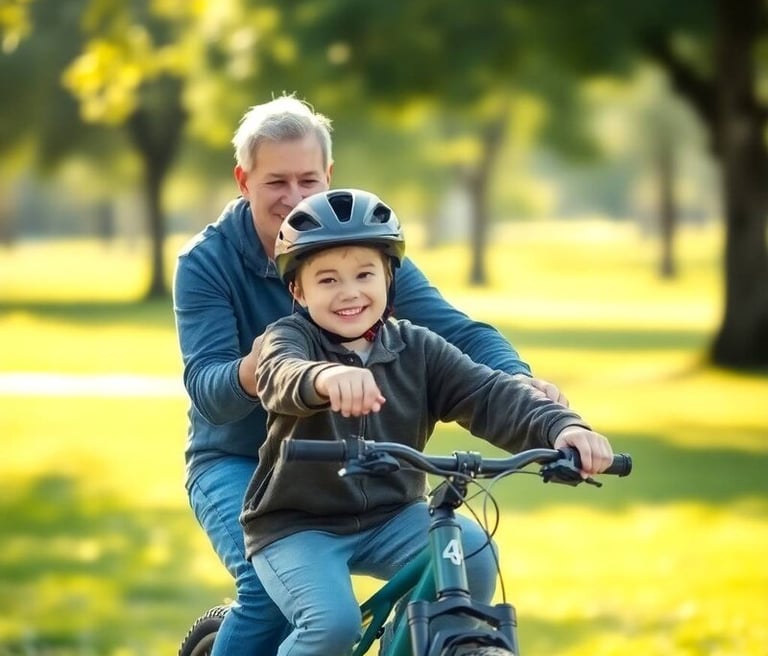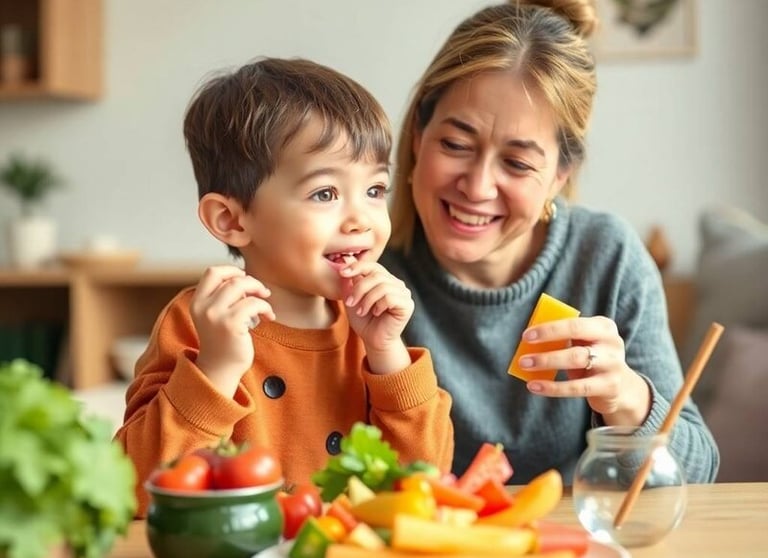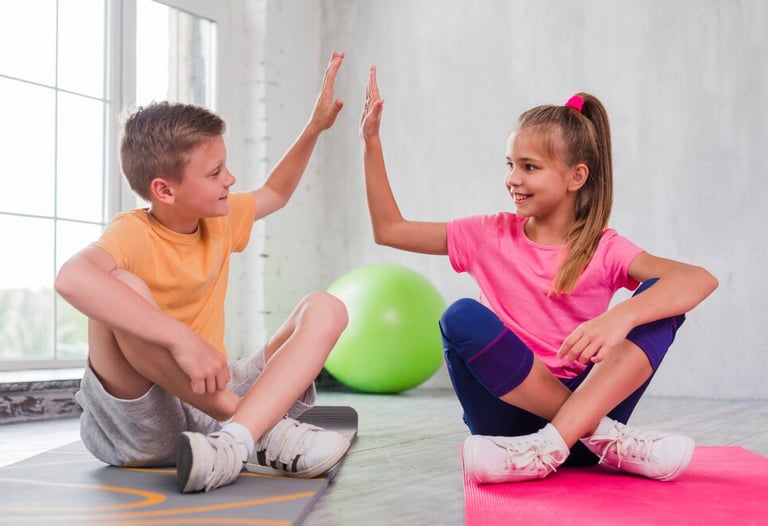🌿🌿 Holistic Health and Well-being in Autism
A child with autism's health extends far beyond medical check-ups. We're talking about their physical, emotional, and mental well-being. In this section, you'll find useful resources and professional recommendations on diet, physical activity, and how certain habits can directly impact their behavior and emotions. Supporting them on this journey with love and knowledge can make a big difference.


🌱 🌱 Health and Well-being in Autism
The well-being of individuals with autism cannot be reduced solely to a clinical diagnosis or a label. It's a daily construction that involves a deep look at their physical, emotional, and social health. Every child or adolescent with ASD experiences the world with a special sensitivity, with a unique way of feeling, relating, moving, eating, and processing stimuli. Therefore, accompanying them from a holistic and respectful perspective is fundamental to enhancing their quality of life. Authentic well-being stems from respecting their individuality, understanding their specific needs, and the commitment of adults to create environments where they feel safe, accepted, and valued. In this section, we want to provide you with accessible, practical, and evidence-based information so you can comprehensively care for all aspects of their development. We will explore together three central areas often overlooked but vital: nutrition, the impact of sugar on behavior, and the importance of physical movement through play and adapted sports. These three pillars not only help improve medical or physiological aspects but also directly influence their emotional well-being, their level of connection with the environment, their ability to self-regulate, and their potential to fully enjoy life. Whether you are at home, in the classroom, or in a therapeutic setting, everything you read here is designed to support you in real life, day by day.
🍬 Sugar, Anxiety, and Autism
The link between what we eat and how we feel is much stronger than we often realize, and this becomes even more relevant in children with autism. Excessive sugar, along with colorings, preservatives, sweeteners, and other additives present in ultra-processed foods, can generate adverse effects on behavior, concentration, emotional state, and sleep quality. In many cases, these components are directly related to increased anxiety, irritability, sensory meltdowns, and difficulty with emotional self-regulation. Therefore, in this section, we invite you to observe carefully the impact certain foods can have on behavior and emotional well-being. We explain why it's advisable to avoid products with high levels of added sugar, how to read labels, which ingredients should be replaced, and what healthier alternatives you can consider. Additionally, we address a fascinating topic: the relationship between the gut and the brain, known as the gut-emotion axis. Taking care of gut microbiota is an indirect way to also care for emotional health. This entire process should be done gradually, without forcing or abruptly eliminating foods. The goal is not to restrict out of fear, but to transform with love and awareness. Even small changes can bring great improvements in the overall mood, sleep, and emotional stability of a child with ASD.


A child with autism's diet isn't just about taste; it's often influenced by sensory, emotional, or even digestive factors. It's very common to find cases of food selectivity, where only certain colors, temperatures, textures, smells, or presentations are accepted. This selectivity can hinder the intake of essential nutrients, affect growth, reduce energy available for learning or playing, and even create family conflicts at every meal. But with support, patience, and appropriate strategies, it's possible to transform eating into a positive experience, free from pressure, and rich in developmental opportunities.
In this section, we teach you how to establish routines that provide predictability and security, which is very important for children with ASD. You'll find ideas for gradually introducing new foods, always respecting their pace and sensory perception. We also discuss which nutrients are fundamental for neurological development and how we can incorporate variety without imposing. Additionally, we offer techniques to reduce the stress that sometimes arises around food, both for the child and the family. Mealtime can be a space for enjoyment, learning, and emotional bonding. The important thing isn't to eat "perfectly," but to advance step by step towards a more complete diet, caring for the emotional experience and always respecting each child's uniqueness.


🍎 Nutrition in Autism
🏃♂️ Autism and Physical Activity for Kids
Movement doesn't just strengthen the body; it also organizes the mind, regulates emotions, promotes socialization, and improves quality of life at all levels. For children with autism, physical and sports activities can be a key tool to channel energy, improve motor coordination, establish routines, learn to wait their turn, boost self-esteem, and experience enjoyment without needing words. The body expresses what often cannot be communicated verbally. Therefore, it's fundamental to offer play and sports spaces that are adapted to their interests, sensitivities, and rhythms.
In this section, we share varied proposals, from simple activities you can do at home or in the classroom, to specific sports that have proven very beneficial for children with ASD, such as swimming, children's yoga, gentle martial arts, hippotherapy, among others. We explain how to adapt each activity to be inclusive, without pressure or demands. You'll also find ideas for creating homemade motor circuits, sensory games with balls, music and movement, and strategies to turn sports time into a safe and anticipated routine. The important thing isn't competition, but enjoyment, connection with one's own body, and bonding with others. When movement is experienced with joy and support, it becomes powerful medicine for the heart, mind, and body.


🚀
I believe that all children should have the opportunity to reach their potential, regardless of how they think.— Temple Grandin🧠 Professor, author, and global reference on autism. Recognized for transforming the livestock industry in the U.S. Autistic person.
🧩 Free Resource for Families and Professionals
We're gifting you a PDF activity kit, ideal for children with Autism Spectrum Disorder (ASD). It includes cutout cards, games to stimulate attention, coloring activities, playful dynamics, and much more.
📚 This material has been compiled from various autism communities with the goal of sharing, supporting, and enriching learning through love and inclusion.
💖 Download it for free and start enjoying it today!
📥
Are you a Professional or Do You Provide Services Related to ASD?
At MiRutaTEA, we're developing a new section where therapeutic companions, psychologists, speech therapists, psychopedagogues, specialized teachers, and other professionals can showcase their services through our app and website.
🧩 What Will You Be Able to Offer?
Therapeutic services, school support, or stimulation.
Workshops, group activities, or intervention proposals.
Links to your social media or professional website.
Contact information so families can easily find you.
💙 How to Join?
We'll soon launch a low-cost monthly subscription system so you can be part of our community. In the meantime, you can complete the contact form and tell us about your work.
🚀 Join a Network Designed to Connect Families with Professionals Committed to the Inclusion and Well-being of Individuals with ASD.
🔗 One Click Makes a Difference
Follow us on social media and help us reach more families with information about autism and alternative communication.
📲 Your support means a lot! 👇
💙 At MiRutaTea, we believe in the power of every voice.
Your experience can support, inspire, and help someone feel less alone.
🧩 Click the button and join the blog: read, share, and be part of the conversation.
This space is yours too.
